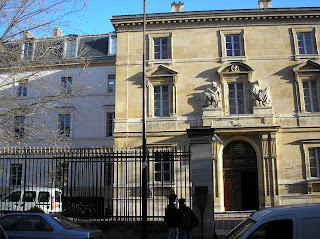September 28, 2008
Obscene
September 20, 2008
Beckett Pilgrimage III



September 18, 2008
A Parallax View
I’m interrupting the literary pilgrimage to bring you the following mental association, brought on by thinking about the life of Samuel Beckett and the death of David Foster Wallace. It doesn’t have anything to do, really, with DFW, but it does with another writer who committed suicide, the English “experimental” novelist B.S. Johnson. Johnson killed himself in 1973, when he was forty years old. By that time he had published six novels; a seventh appeared posthumously.
In Like A Fiery Elephant: The Story of B.S. Johnson, Jonathan Coe tells how Johnson got to meet his hero, Samuel Beckett, in Paris in 1966. Johnson had already been sending the older writer what Coe describes as “fan letters” as well as copies of his first couple of books, and as a result of this first meeting Beckett became an even more important figure to Johnson. They would meet on further occasions over the subsequent years, to “drink whiskey and play billiards together” whenever Johnson went to Paris, and they exchanged letters and postcards in between times. On Beckett’s side these were invariably rather “brief and functionally worded,” Coe reports, and although the relationship was clearly a significant prop to Johnson’s morale Coe is agnostic about Beckett’s investment in it beyond hazarding the opinion that there was probably more to it than mere “writerly courtesy.” Beckett certainly proved ready to give practical support to Johnson on several key occasions, including writing a letter to a recalcitrant editor testifying to Johnson’s talent, sponsoring Johnson for an Arts Council grant, and even helping him out financially. In 1973, however – a bad year generally for Johnson – he found the limit of Beckett’s generosity when he used a flattering remark from their private correspondence as a jacket blurb for Christie Malry’s Own Double-Entry without Beckett’s permission. Beckett replied with an angry letter that seemed to have brought an end to their relations. One a Sunday night in the November of that same year, Coe reports that Johnson tried unsuccessfully to reach Beckett on the phone a number of times. The next night Johnson successfully opened his arteries in the bathtub.
Isolating this particular sequence from the rest of the biography has the disadvantage of creating a narrative in which the disintegration of the Beckett relationship appears to have a major impact on Johnson’s decision to end his life. He had bigger problems – he was separated from his wife, drinking more and more heavily, and deeply unhappy about the reception of his work. But – especially given Johnson’s penchant, described by Coe, for finding omens everywhere – the end of his friendship with a figure who occupied so large a place in his literary imagination couldn’t have helped.
Six or seven months after I read the B.S. Johnson biography I happened to read James Knowlson’s biography of Samuel Beckett, Damned to Fame. (OK, OK, so I read a lot of literary biographies. We’ll talk about it some time soon, I promise.) It was 700-plus pages of small print, with plenty of mundane minutiae before and between the major works on the long way from Cooldrinagh to the Cimitiere de Montparnasse– but not a word about B.S. Johnson. Nothing. Samuel Beckett is cited about 21 times in the index of B.S. Johnson’s biography; the number B.S. Johnson citations in the index of Beckett’s biography is exactly 0.
Of course, you could argue that that’s Knowlson, really, and not Beckett. Maybe Beckett’s thoughts recurred frequently and fondly (at least before that unauthorized blurb) to his young British friend; he certainly didn’t hesitate to send a consoling letter to Johnson’s widow after hearing the bad news. And in a sense Knowlson did refer to Johnson, in a passage talking about (and I’m paraphrasing here because I’m sure as hell not going to try to look it up) the number of people who sought out Beckett in the years of his fame with their hands out for friendship, advice, a touch of apostolic succession, or money. Maybe that was B.S. Johnson in the life of Samuel Beckett – a petitioner, one of many.
Just in case, however, I checked the other two Beckett biographies. In the index of Deirdre Bair’s, no B.S. Johnson. Next, Cronin’s The Last Modernist – and a hit! One citation, page 546 . . . I rifle the pages . . . here it is: “One of the recipients of his generosity was the experimental novelist BS Johnson, whose sports-car was said to have been bought with Beckett's Nobel money.” Ouch.
Coe says this isn’t true, by the way. The money from Beckett went for groceries. Funds for the sports-car came from somewhere else, and anyway Johnson had to sell it eventually.
But go back to that moment when I was looking at the index in the Knowlson biography and confirming that Johnson had indeed been a no-show through the whole 700 pages. That’s really the point of this blog entry – that shift in perspective, from how large a figure Beckett cut in Johnson’s life to how small or even negligible a figure was Johnson in Beckett’s. It made me a little sick to my stomach when I first discovered it – the elevator-lurch sensation that makes us imagine, if only for an instant, a vertiginous abyss – a little sick and then very sad.
Yes, sad enough for me to forget my own problems for, oh, the five minutes it took me to realize that even here was yet another restaging of my own anxieties about literary anonymity. Our narcissism is inescapable. That's a banality, of course – but what determines when our narcissism might be the very thing that saves us, or the very thing that . . . well, you know what I mean.
September 16, 2008
Beckett Pilgrimage II
Beckett Pilgrimage

















